Thomas Hobbes
This unit examines the philosophical foundations of political systems. We must remember that government is not a natural phenomena; governments have been created by people. We may feel far removed from the ideas and communities that shape our politics, but we’re not; political institutions are continually evolving and we all help to shape them.
Legitimacy & Authority: what gives government the right to govern?
We need to understand the way political theories have tried to justify and ‘ground’ the right of governments to govern.
We need to ask:
- how have ideas about human nature shaped our political institutions?
- what makes power legitimate? (what gives someone or some people a the right to claim power over others?)
- what is the difference between being ‘in authority’ and ‘an authority’? (basically the difference between having power and having wisdom.)
- how might we justify defying a government if we don’t like what they do?
Thomas Hobbes’ Leviathon
We began examining these ideas and questions through through Thomas Hobbes’ famous book, Leviathon. We saw how Hobbes, writing during the English civil war, a period when ideas about legitimate power were up for grabs, tried to justify the idea of having a powerful leader, a ‘leviathan’, to keep people in order. (He wrote it in France just in case it upset anyone - which was easy to do and potentially fatal at that time!)
Man in the ‘State of Nature’
A Pre-societal Situation
Hobbes grounds his ideas about government with an account of the way he feels people would behave without government or society of any kind. He thinks that people in this ‘natural condition’ before any kind of society (pre-societal) would be more or less ‘equal in the faculties of body and mind’, but rather than suggesting that this would make people co-operate he thinks it would mean that ‘the weakest has strength enough to kill the strongest’, even if they have to get together with other ‘weaklings’ and sneak up on the strongest person to kill them. What’s more he thinks that people in this situation would be quite happy to do someone else in if it was to their own advantage.
Hobbes believes that, From this equality of ability ariseth equality of hope in the attaining of our ends. And therefore if any two men desire the same thing, which nevertheless they can-not both enjoy, they become enemies;
In other words because we are roughly equal, we see everyone else as competition and so we are bound to ‘quarrel’
Hobbes distinguishes;
‘three principal causes of quarrel. First, com-
petition; secondly, diffidence; thirdly, glory.
He tells us that,
‘The first maketh men invade for gain; the second, for safety; and the third, for reputation.’
In other words:
We fight each other to get stuff.
We fight each other because we don’t trust or care about each other.
We fight each other because we do care if people don’t respect us.
Hobbes characterised all this nastiness amongst people in the ‘natural condition as a ‘war of every man against every man’ So Hobbes’ view of human nature is rather bleak and pessimistic.
Social compact
We saw how Hobbes believed that despite all this unpleasantness men’s reason would allow them to recognise the ‘fundamental law of nature .. which is: to seek peace and follow it.’ They would recognise this because it would represent their best chance of survival as in the ‘state of war’ there is ‘no place for industry, because the fruit thereof is uncertain,’ in other words there’s no point building a shelter as someone will kick you out of it pronto! He also says there would be; no culture of the earth; no navigation, nor use of the commodities that may be imported by sea; no commodious building; no instruments of moving and removing such things as require much force; no knowledge of the face of the earth; no account of time; no arts; no letters; no society;
Nothing in fact but lots of bundles.
So the rational thing to do is ‘to seek peace’, and from this first law of nature a second law follows: ‘that a man be willing, when others are so too, [to] be contented with so much liberty against other men as he would allow other men against himself.’ In other words you give up your right to interfere with others if they give up their right to interfere with you. In making this kind of agreement you entering into a contract; Hobbes says ‘The mutual transferring of right is that which men call contract.’
Hobbes believed that given the selfish and competitive nature of humankind the only way such a contract could be guaranteed was for it to be overseen by a powerful leader who could punish any who broke it. He thought that ‘nothing is more easily broken than a man's word’ but that we might keep this contract ‘from fear of some evil consequence upon the rupture.
This leader is Hobbes ‘Leviathan’; the Leviathan is both an embodiment of the people (see the picture from the front of the book, the ‘frontispiece’) and a great power above the people. It represents the combined power of all the people and through this power it overpowers those individuals who break the compact not to harm others.
Although Hobbes was against the hereditary principle by which Kings were born not chosen, he believed that the most effective form of leadership was some kind of monarch or dictator.
Hobbes is most famous for suggesting that without such a ruler the life would be ‘solitary, poor, nasty, brutish, and short.’









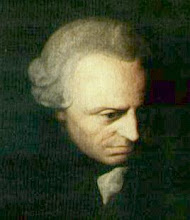
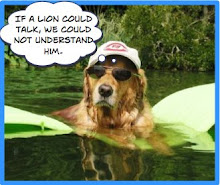
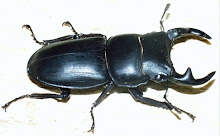
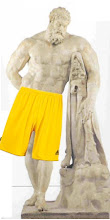


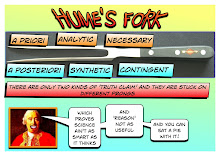
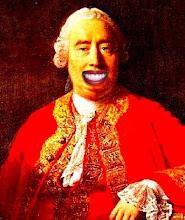



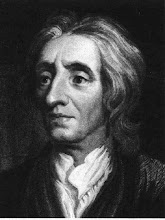.jpg)

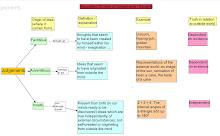
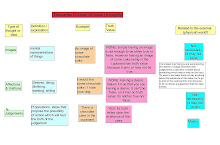
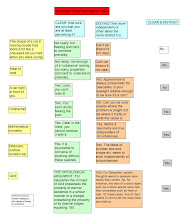



No comments:
Post a Comment